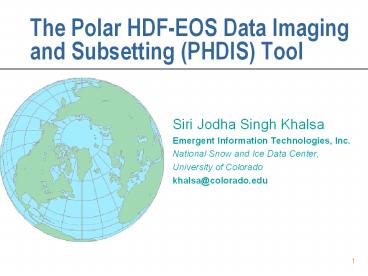The Polar HDF-EOS Data Imaging and Subsetting (PHDIS) Tool - PowerPoint PPT Presentation
Title:
The Polar HDF-EOS Data Imaging and Subsetting (PHDIS) Tool
Description:
Evaluate suitability of HDF-EOS for data sets in polar projections ... Future: MODIS, AMSR, GLAS. HDF_EOS IV 19.9.2000. 5. Demonstration ... – PowerPoint PPT presentation
Number of Views:24
Avg rating:3.0/5.0
Title: The Polar HDF-EOS Data Imaging and Subsetting (PHDIS) Tool
1
The Polar HDF-EOS Data Imaging and Subsetting
(PHDIS) Tool
- Siri Jodha Singh Khalsa
- Emergent Information Technologies, Inc.
- National Snow and Ice Data Center,
- University of Colorado
- khalsa_at_colorado.edu
2
Genesis ESDIS Prototype
- Evaluate suitability of HDF-EOS for data sets in
polar projections - Convert sample NSIDC DAAC data sets to HDF-EOS
- Build tools to subset, subsample, visualize and
export data fields from multiple products
3
Realize the promise of HDF-EOS
- One tool to open, read, display and subset any
data set - Utilize geolocation metadata
- Provide simple interface for geographic
subsetting, subsampling, and export
4
DAAC Perspective
- Be able to provide a single tool for all polar
gridded DAAC data sets - Heritage AVHRR, SSM/I, TOVS
- Future MODIS, AMSR, GLAS
5
Demonstration
- The Polar HDF-EOS Data Imaging and Subsetting
Tool - IDL-based (multi-platform)
- For any HDF-EOS file a user can
- examine data contents
- visualize and compare the data fields
- overlay lat/lon lines and/or coastlines
- designate subregions for zooming in on or
displaying values
6
Opening Window
- Select one or more file to examine
- When one or more files have been selected the
Load Data Field(s) window is opened. - When data fields have been loaded, user returns
to this screen to View Image Data
7
Selecting Data to Load
- Available fields from all selected files are
displayed along with projection information. - Clicking on a field name loads it.
8
Displaying a Data Field
- Selected fields are grouped by projection.
- Clicking on a row will open a window containing
the first field in that projection. - User may replicate the window or toggle through
the images in the default window
9
Initial Display
- Data displayed with gray scale palette.
- Mode menu changes click action
- Toggle images
- Define zoom box
- Browse select between multiple zoom boxes.
10
Top level window is scaled to fit users display
while showing entire data array. User can load
multiple fields and toggle between them or
display them in new windows.
User first selects one or more files to open.
Instructions for defining a region of interest
(ROI) in any visualization window. Box parameters
displayed while user positions box.
Metadata is read and displayed. User then selects
field(s) to load.
Table of values includes location and size of
selected region.
Multiple ROI boxes can be registered. Contents
visualized in new window and can be displayed in
a table.
Double clicking in a box brings up this menu.
(Print and Write to File will be added.)
Selecting View Image Data brings up window from
which user selects field to visualize.
11
Image with Legend
- Includes palette and a thumbnail image locating
the current window in overall array if zoomed.
12
New Features to be Added
- Coupled images from different grids.
- Coastline and graticule overlay in zoom window.
- Autoreplicate for 3 or less fields.
- View Core and Structural metadata.
- Mapping between table cell and image pixel
- Read and display swath data.
13
Conclusions
- HDF-EOS enables discipline-specific tools to be
developed - Polar HDF-EOS Website created
- http//nsidc.org/PROJECTS/HDFEOS

